Friday, March 31, 2006
Dropping Knowledge: Manning Marable and Russell Simmons Dialogue on Hip Hop
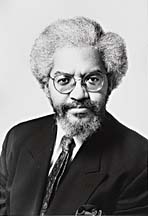
from The Politics of Hip Hop
By Manning Marable, 2002
"What the essential politics of art is about is the politics of collective imagination, the transformative politics of freeing one’s mind. In a recent interview, KRS-One observed that hip hop is the only place where Dr. Martin Luther King’s `I have a dream’ speech is visible.... Today, with the help of hip hop, they’re all hip-hoppers out there. I mean black, white, Asian, Latino, Chicano, everybody. Hip-Hop has formed a platform for all people, religions, and occupations to meet on something. KRS-One adds, that, to me, is beyond music."

Columbia University Dialogue On Hip Hop and Positive Social Change
Rap Music Provides a Roadmap for Positive Societal Change, Says Def Jam's Russell Simmons in dialogue with Manning Marable, Columbia history and political science professor.
Real (25:08) Audio
In the dialogue, Marable and Simmons also delve into those artistic and personal traits that allowed artists from the first golden age of hip hop to stand apart from the crowd and carve out an audience for the nascent form. Simmons explains why he thought Run DMC and The Beastie Boys had artistic honesty and integrity that was definitely informed by but transcended their ethnic and racial identities. Cultural and artistic honesty is viewed by Simmons as a central value of all great Hip Hop artists.
In the dialogue Russell Simmons tells the funny story of how The Beastie Boys had a rock band called Useless Teenagers and a Rap act and that when he went to see them they wore the same outfit for both acts - red pumas, red suits and red doo-rags and that their approach to hip hop was honest and emerged organically from their experience. Its important also to note, according to Simmons, that Run DMC were featured in Rolling Stone 10 - 15 times before they appeared in Essence or the Black press. So, it was Rock (read white) audiences that first catapulted Hip Hop to national prominence. He said in the interview that before Run DMC, rappers would change out of their outfits, once they were done with their acts, to look more like punks or rockers and that it was Run DMC that finally said no to that and wore their hood uniform, the black leather and such, on and off the stage. In order to be artistically honest, Simmons implies, you can't try and be someone you're not; you can't try and take on a cultural expression that doesn't come naturally to you.
Tuesday, March 28, 2006
Wole Soyinka's Climate of Fear: The Quest for Dignity in a Dehumanized World
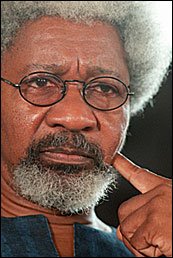 "The history of contempt and disdain, and the denial of that rather unquantifiable virtue called dignity is at the heart of the current state of fear."
"The history of contempt and disdain, and the denial of that rather unquantifiable virtue called dignity is at the heart of the current state of fear."In 2004, Nobel Laureate, playwright, poet and political activist Wole Soyinka delivered the U.K.'s prestigious Reith Lectures Cimate of Fear. In four terrific lectures (audio recordings and trascriptions of which are now available online) the blindingly erudite and eloquent Soyinka, examined the conglomeration of inchoate terrors that presently haunt humanity: from the unquantifiable specter of a globalized Al Qaeda, with its networks of leaderless cells poised to strike at any moment; to the equally paralyzing and brutal responses of states - torture, rendition, surveillance, secret prisons and "war without end." In 2005, the lectures were developed into a book titled Climate of Fear : The Quest for Dignity in a Dehumanized World
"A notable aspect of all-pervasive fear is that it induces a degree of the loss of self-apprehension - a part of one's self has been appropriated, a level of consciousness, and this may even lead to a reduction in one's self-esteem - in short, a loss of inner dignity.
What terrifies the world however is no longer the possibility of over-muscled states unleashing on the world the ultimate scenario - the Mutual Assured Destruction that once, paradoxically, also served as its own mutually restraining mechanism. Today the fear is one of furtive, invisible power, the power of the quasi-state, that entity that lays no claim to any physical boundaries, flies no national flag, is unlisted in any international associations, and acts every bit as mad as the M.A.D. gospel of annihilation that was so calmly annunciated by the super-powers.
Any course of action, or inaction, that appears to encourage impunity, does implicate, however, the submission of the world to a regimen of fear. Yet that very recognition makes it possible to propose that it is within collective, not unilateral action...that we can sustain the hopes of humanity's survival. Terror against Terror may be emotionally satisfying in the immediate, but who really wants to live under the permanent shadow of a new variant of the world's - Mutual Assured Destruction?"
Monday, March 27, 2006
"For African-American children, there is a 'slippery slope' leading from children's protective services to juvenile detention...and possibly prison"
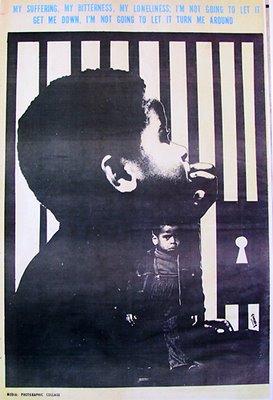
A report from the Michigan Advisory Committee on the Overrepresentation of Children of Color in Welfare says that,
The state must recognize that something is systemically wrong when African-American children make up only 18 percent of Michigan's population but represent more than 50 percent of the kids under state protection for abuse and neglect.
"Talking about race in general is very difficult and talking about child welfare is difficult," Marianne Udow, director of the Michigan Department of Human Services and a co-chair of the committee, said in an interview. "You put those two issues together and it can be very explosive, very emotional."
The report raises the possibility of inadvertent racism on the part of people throughout the child welfare system.
"Some (workers) were very offended at the suggestion that race would play any part in a decision whether to remove a child" from an abusive home, Udow said. "But it's not overt racism or individual racism; it's decisions that get made all along the way."
Looking to turn the statistics around, lawmakers directed the DHS to study why minority children are over-represented when it comes to being abused, neglected or in trouble with the law.
Art is by Emory Douglas who worked as a graphic designer, illustrator, poster artist and political cartoonist for the Black Panther Party
compiled from articles on LSJ.com and Mlive.com:
Desperate Rivals Try to Smear Dellums with Questions about His Lobbying Days
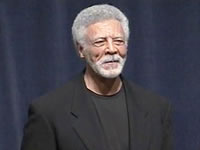 According to the San Francisco Chronicle,
According to the San Francisco Chronicle, "It's starting to get personal in the Oakland mayor's race -- and the focus is front-runner Ron Dellums' post-congressional career as a Washington lobbyist.
In their efforts to escape Dellums' shadow, rivals Nancy Nadel and Ignacio De La Fuente are going after the longtime congressman's reputation for political purity. The targets include his refusal to release tax returns, questions over how his profession would be described on the ballot -- and his recent service in the revolving-door ranks of lawmakers-turned-lobbyists.
"The voters have a right to know what we've done and what we've earned for the last eight years,'' De La Fuente said at a news conference Thursday, pressing Dellums to join him in releasing his income taxes.
"There is nothing wrong with being an honorable lobbyist,'' Dellums told The Chronicle, adding that the only people questioning his time as a lobbyist were his mayoral rivals.
Dellums' work on behalf of ousted Haitian President Jean-Bertrand Aristide, has also come under scrutiny.
According to several published accounts, Dellums was paid $571,000 by Aristide in 2001 and 2002 to help improve his relations with the U.S. government and international lenders.
Dellums makes no apologies for his work for Aristide, who was overthrown in a rebellion in 2004.
"It was a dark day in American history (when the U.S. government) allowed a democratically elected president to go down in this hemisphere,'' he said. "I'm proud of the work I did there.''
While I think the public does have a right to know what happened during his days as a lobbyist, what I smell here is a smear job by the Chron...I mean where are the discussions of his positions on the issues, his record in Congress, or his vision of where the city should be headed? There are subtle ways of framing and trying to box in a candidate and the this op-ed seems to suggest shadowy or unethical lobbying activities. In this case, it's hard for me to trust a paper that is clearly in the corner of Gavin Newsom.
Monday, March 20, 2006
Belafonte for President
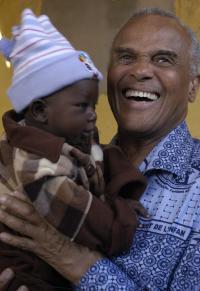 By now, no doubt, you have heard that Harry Belafonte was "un-invited" to the Coretta Scott King funeral when George Bush said he would attend. I keep asking myself, "Why didn't the King children un-invite Bush?" How the King Children could publicly dis a long-time family friend who watched over their future and who was as close as any to their mother mystifies me. Shame on them.
By now, no doubt, you have heard that Harry Belafonte was "un-invited" to the Coretta Scott King funeral when George Bush said he would attend. I keep asking myself, "Why didn't the King children un-invite Bush?" How the King Children could publicly dis a long-time family friend who watched over their future and who was as close as any to their mother mystifies me. Shame on them.Although I'm sure such a slight had to hurt to the core, Belafonte has not been publicly bitter. Rather, he has called for self reflection. He has called on those movement soldiers in whose shadow the King children have grown up to think together on how such a situation could have come to pass. In forums he has participated in recently, such as the one at Cooper Union with Walter Mosley and Tavis Smiley's the State of the Black Union event, Belafonte continues to inspire people to renew their commitment to freedom, to justice, to equality and to the moral duty to continuously point out the gulf between the ideals America espouses and the realities she purveys. Moreover, with gumption and extraordinary media savvy he has inserted his clarion into the media din and spoken truth to power. And although, when Mosley suggested that Belafonte would be a great president, he balked, I can think of no other Black leader with the dignity, courage, intelligence, candor, wit and commitment as Harry Belafonte. May he live a long life...God knows we need him.
Saturday, March 11, 2006
The State of the Black Union 2006 & The Covenant with Black America
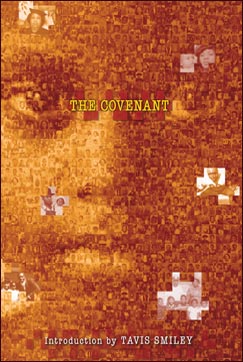 From the invocation by Rev. Dr. Joseph Lowry, to the great panels and debates, "The 7th Annual State of the Black Union" held in Houston this year on February 2006 in the shadow of the wake up call that was Katrina was a powerful convening of Black leaders. Now in its 7th year the event also was the staging ground for the publication of a collection of essays compiled from the event titled The Covenant with Black America. Tavis Smiley's work as a broadcaster and event organizer has helped create what over the last 7 years has a become a crucial forum where Black people come together to discuss, debate and take collective action on our future. I believe that the publication of The Covenant with Black American and this annual event are essential and critical elements in the current phase of Black empowerment. So, If you weren't able to be there in Houston on February 26th catch it online here and organize a meeting, a potluck, a viewing party in your home or community. We all need to get inolved in serious discussions about the state of the black union.
From the invocation by Rev. Dr. Joseph Lowry, to the great panels and debates, "The 7th Annual State of the Black Union" held in Houston this year on February 2006 in the shadow of the wake up call that was Katrina was a powerful convening of Black leaders. Now in its 7th year the event also was the staging ground for the publication of a collection of essays compiled from the event titled The Covenant with Black America. Tavis Smiley's work as a broadcaster and event organizer has helped create what over the last 7 years has a become a crucial forum where Black people come together to discuss, debate and take collective action on our future. I believe that the publication of The Covenant with Black American and this annual event are essential and critical elements in the current phase of Black empowerment. So, If you weren't able to be there in Houston on February 26th catch it online here and organize a meeting, a potluck, a viewing party in your home or community. We all need to get inolved in serious discussions about the state of the black union. "The 7th Annual State of the Black Union." "Economic Empowerment: Building and Leveraging Wealth in the Black Community & Defining the African American Agenda Part II." explores topics such as entrepreneurship, investing, jobs, the economy and setting the African American agenda. Panelists in Part 2: Harry Belafonte, Na’im Akbar, Raymond Brown, U.S. Rep. Melvin Watt, Cornel West, Kimberle Williams Crenshaw, Bishop Harry Jackson, Rep. Jennette Bradley, Nikki Giovanni
GET INVOLVED! HOST YOUR OWN "STATE OF THE BLACK UNION" GATHERING Get The Covenant with Black America Town Hall Toolkit!
Friday, March 10, 2006
Robin Deacon is a funny man
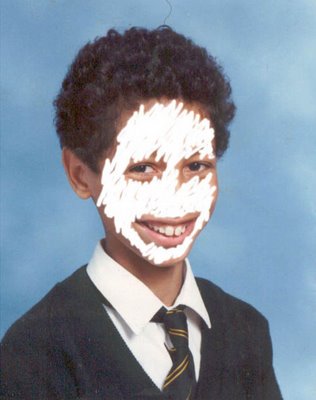
Robin Deacon (b 1973) is a British performance artists whose work
"invites us to think about racial politics, using highly intelligent, ararchic humour. With a combination of slapstick comedy and what appears to be barely contained rage..."In recent works, Harry and Me and Colin Powell, both from 2004, Deacon assumed a kind of "conpiracy theorist" persona to interrogate the history and biography of a charachter called Robin Deacon. Check him out at robindeacon.com
Favorite European Product of the Day: Negro's

Eti's Negro biscuit is described as "A special cream biscuit with the full dark taste of real cocoa complemented by vanilla flavour cream. Doesn't that description sort of remind you of Seal and Heidi Klum

Bad Race Funny from My Mom:
My mom's friend has some land in Mississippi and called a male friend to see if he knew how to get rid of a woodpecker. He said he didn't but he'd try to find out and call her right back. A couple of minutes later he called back and gave her a number for the NAACP. "The NAACP?" she asked confused. "Didn't you say you needed to get rid of a peckerwood?"
Wednesday, March 08, 2006
C'est vrai! Harry Roselmack will be first Black anchor on French TV

Harry Roselmack - France's first Black news anchor
I guess if you burn down the town they'll put a brown face on the tube. Seems French ministry of culture is getting the message that French culture needs to start, at least acting, multicultural. So, 32-year-old Harry Roselmack, a journalist from Martinique will get the role as France's first Black television news anchor this summer. According to a blurb in the New York Times, Roselmack will fill in for France's best known anchor, Parick Poivre d'Arvor, on the popular evening news while Mr. Poivre d'Arvor is on vacation. I guess this is only a trial run for Roselmack? Why not just give him a slot? You know, it's way late for this kind of first in France. But, I guess later is better than never...and hey, its the least they can do...particularly, if it will keep the Black kids in the ghettos from burning down the town again
Gordon Parks Dies at 93
 I remember as a young artist being told again and again that I had to specialize and feeling like I was being boxed in. Well, no one ever told Gordon Parks that he had to specialize, and if they did he ignored them. He mastered photography, painting, music, film, and the novel and broke barriers for Blacks in every one. In his 80's I got to speak with him briefly at a book-signing in Chicago and he was still bright with energy, wit and artistic ambition. He was a man for the ages. It's would be difficult to imagine Black American culture without him. A giant! Thanks Mr. Parks. We'll miss you.
I remember as a young artist being told again and again that I had to specialize and feeling like I was being boxed in. Well, no one ever told Gordon Parks that he had to specialize, and if they did he ignored them. He mastered photography, painting, music, film, and the novel and broke barriers for Blacks in every one. In his 80's I got to speak with him briefly at a book-signing in Chicago and he was still bright with energy, wit and artistic ambition. He was a man for the ages. It's would be difficult to imagine Black American culture without him. A giant! Thanks Mr. Parks. We'll miss you. from Time
"...He made countless pictures of the glories and burdens of African-American life at a time when an unapologetic white racism was the rule, and sometimes the law, in places all around the country.
He could make those pictures because he possessed not only an alert eye but also an experienced heart."
Tuesday, March 07, 2006
Malian Master Musician Ali Farka Toure Dies
 Excerpt from The Independent
Excerpt from The Independent "The legendary African guitarist Ali Farka Toure has died. Toure, who pioneered his distinctive "desert blues" sound on successive albums which won him a global following as well as two Grammy Awards, died in his sleep in his native Mali. He had been suffering from bone cancer and was in his late sixties.
His death robs Mali of one of its most beloved figures. Radio stations suspended programmes to play his music. Mali's Culture Minister, Cheick Oumar Sissoko, said: "Ali was for Mali, for Africa and for the rest of the world a very great musician. A musician who leaves behind him a fabulous heritage. We are receiving phone calls and e-mails from around the world."
allmusic.com Ali Farka Toure overview


